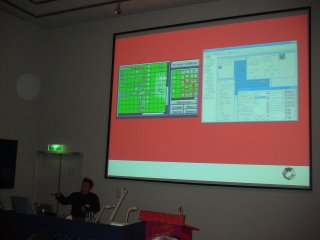They started out to explain that the present development in serious gaming should go beyond the horse carriage syndrome; the first automobile looked like a horse carriage. So a close look at what a serious game is, will be needed. The basic question with a game is whether a game like Pong is about tennis or something else. With a fine example, it was explained that serious games are about the excitement of discovering the rules. When you play table tennis you need a flat table. When you change the flat table into a table that looks like a wave, the wave-shaped begs for other rules.
Games have three components: at the centre the rule model, covered by a declaration layer and a social layer. In the game Sims the social layer is all about interacting, while the declaration layer is about the décor and presentation. But Sims is all about the rules. If you have not discovered the rules, but are stuck in the declaration phase you only can expand your neighbourhood. Games turn around social rules, but serious games are all about the rule set.
 Are games fit for education? That depends how you look at it. Every new medium like slides, video and computers has its dream phase in the development cycle. But this phase is usually followed by disappointment. This was also the case in education with Computer supported learning. This delivered drill and practice games. In order to learn the cities of a country, you could sit in a helicopter and fly and discover the skyline of a city. So the main costs were in producing the contents. However, constructive learning let pupils make rules themselves; a good rule engine for this is Gamemaker by game professor Mark Overmars.
Are games fit for education? That depends how you look at it. Every new medium like slides, video and computers has its dream phase in the development cycle. But this phase is usually followed by disappointment. This was also the case in education with Computer supported learning. This delivered drill and practice games. In order to learn the cities of a country, you could sit in a helicopter and fly and discover the skyline of a city. So the main costs were in producing the contents. However, constructive learning let pupils make rules themselves; a good rule engine for this is Gamemaker by game professor Mark Overmars.Willem-Jan Renger gave the audience a piece of advice:
- didacticians, designers and game makers should sit together and develop teaching material using the principles of serious gaming;
- publishers should not develop costly content, but middleware and educational rule sets;
- Publishers should not replace educational tools from print to games;
- Produce simple rule sets.
Tags: games, education

No comments:
Post a Comment